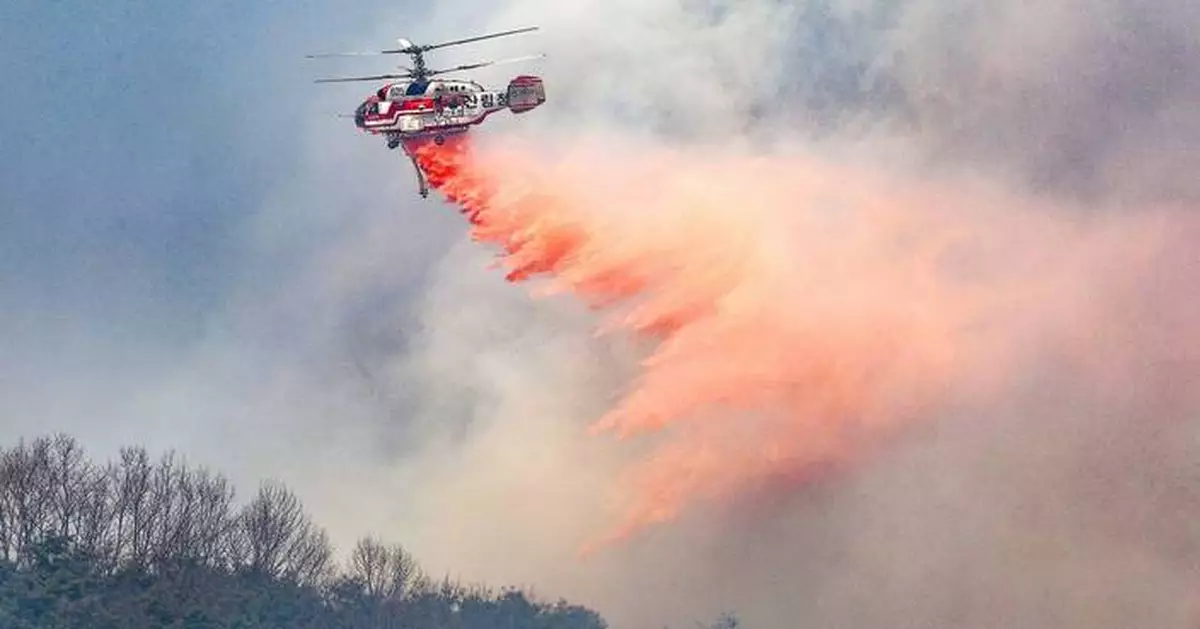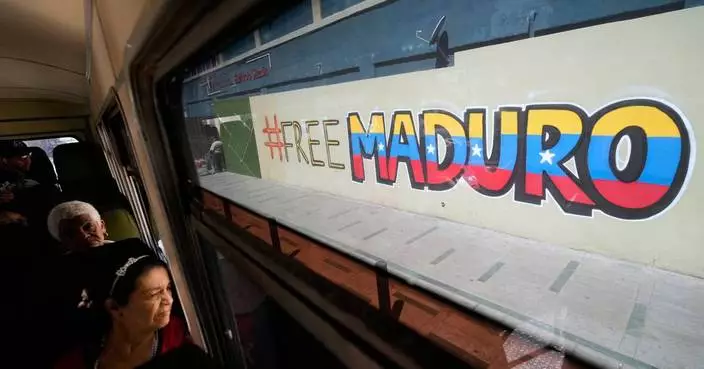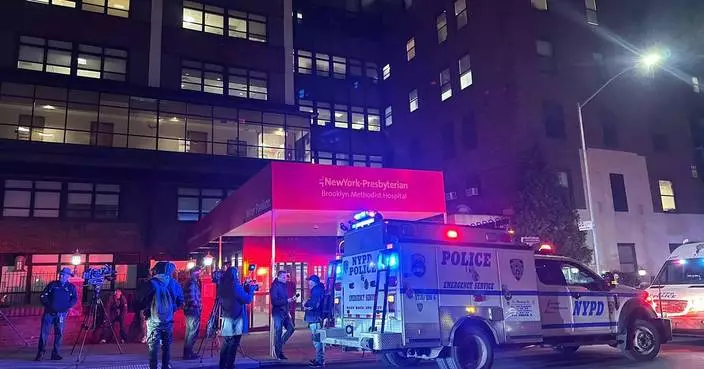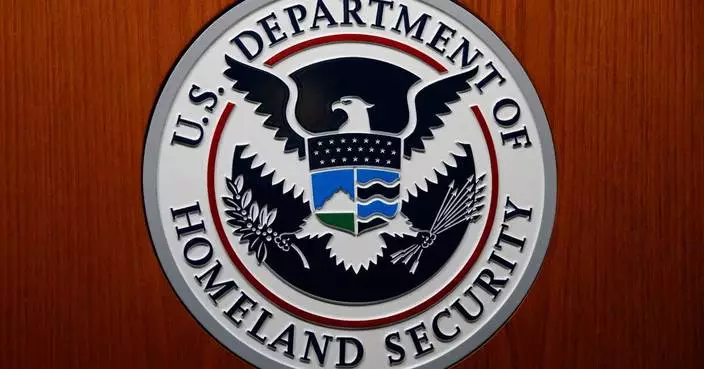SEOUL, South Korea (AP) — Officials in the South Korean city of Andong on Tuesday alerted residents to evacuate to safe areas as firefighters struggled to contain wildfires that have ravaged southern regions since last week, forcing thousands to flee and destroying likely hundreds of structures, including a 1,300-year-old Buddhist temple.
Thousands of firefighters in South Korea were battling at least nine wildfires across the country as of Tuesday afternoon, after the blazes fueled by dry winds burned more than 36,300 acres of land in the past five days.
Click to Gallery
Smoke rises from a mountain in Andong, South Korea, Tuesday, March 25, 2025. (Kim Doo-hoon/Yonhap via AP)
Smoke rises from a mountain in Andong, South Korea, Tuesday, March 25, 2025. (Kim Doo-hoon/Yonhap via AP)
A Korea Forest Service helicopter dumps fire retardant on a wildfire in Sancheong, South Korea, Tuesday, March 25, 2025. (Kim Dong-min/Yonhap via AP)
A firefighter works to extinguish a fire at a house that has been engulfed in a wildfire in Uiseong, South Korea, Tuesday, March 25, 2025. (Yoon Gwan-shick/Yonhap via AP)
Houses burn in a village after being engulfed by a wildfire fueled by strong winds in Uiseong, South Korea, Tuesday, March 25, 2025. (Yoon Gwan-shick/Yonhap via AP)
Smoke rises from a mountain in Andong, South Korea, Tuesday, March 25, 2025. (Kim Doo-hoon/Yonhap via AP)
Houses burn in a village after being engulfed by a wildfire fueled by strong winds in Uiseong, South Korea, Monday, March 24, 2025. (Yoon Gwan-shick/Yonhap via AP)
A road is closed as a wildfire fueled by strong winds spreads in Uiseong, South Korea, Monday, March 24, 2025. (Yoon Gwan-shick/Yonhap via AP)
A Korea Forest Service helicopter dumps fire retardant on a wildfire in Uiseong, South Korea, Monday, March 24, 2025. (Yoon Gwan-shick/Yonhap via AP)
Officials in Andong, a city in the country’s southeast, and the nearby town of Uiseong ordered residents in several villages and those near Andong University to evacuate to safe locations or temporary shelters — including schools and indoor gyms — as a fire that started in Uiseong continued to spread due to strong winds. The fire in Andong was also reaching the village of Pungcheon, home to the Hahoe folk village, a UNESCO World Heritage site founded around the 14-15th centuries.
The blaze in Uiseong destroyed Gounsa, a Buddhist temple built in the 7th century, according to officials from the Korea Heritage Service. There were no immediate reports of injuries, and some of the temple’s national treasures, including a stone Buddha statue, were evacuated before the fire reached the wooden buildings.
The fire was also spreading to the nearby coastal town of Yeongdeok, where officials shut down roads and ordered residents of at least four villages to evacuate. The Justice Ministry did not immediately confirm local reports that it had begun relocating some 2,600 inmates from a prison in Cheongsong county, near Uiseong.
More than 3,700 firefighters, along with 76 helicopters and 530 vehicles, were deployed to battle the fires in the Uiseong and Andong areas, which were nearly 70% contained as of Tuesday evening, according to the Korea Forest Service.
The service raised its wildfire warning to the highest “serious” level nationwide, requiring local governments to allocate a larger work force for emergency response, tighten entry restrictions for forests and parks, and recommend that military units withhold live-fire exercises.
South Korean officials said earlier on Tuesday that firefighters had extinguished most of the flames from the largest wildfires in the country’s southern regions, including Uiseong, the neighboring town of Sancheong, and Ulsan city. However, the ongoing dry and windy weather now appears to be causing setbacks.
Four firefighters and government workers were killed in Sancheong on Saturday after being trapped by fast-moving flames driven by strong winds. At least 11 other people have been injured by wildfires around the country since last Friday, according to the Ministry of the Interior and Safety.
The national government designated the hardest-hit southeastern regions as disaster zones to focus resources and accelerate recovery efforts.
Prime Minister Han Duck-soo, serving as the country’s acting leader following President Yoon Suk Yeol’s impeachment over a December martial law decree, vowed an all-out effort to contain the wildfires during a government meeting on Tuesday. He also urged public vigilance as dry spring weather persists.
Government officials suspect that several of the recent wildfires, including those in Uiseong and Ulsan, were caused by human error, possibly due to the use of fire while clearing overgrown grass in family tombs or sparks from welding work.
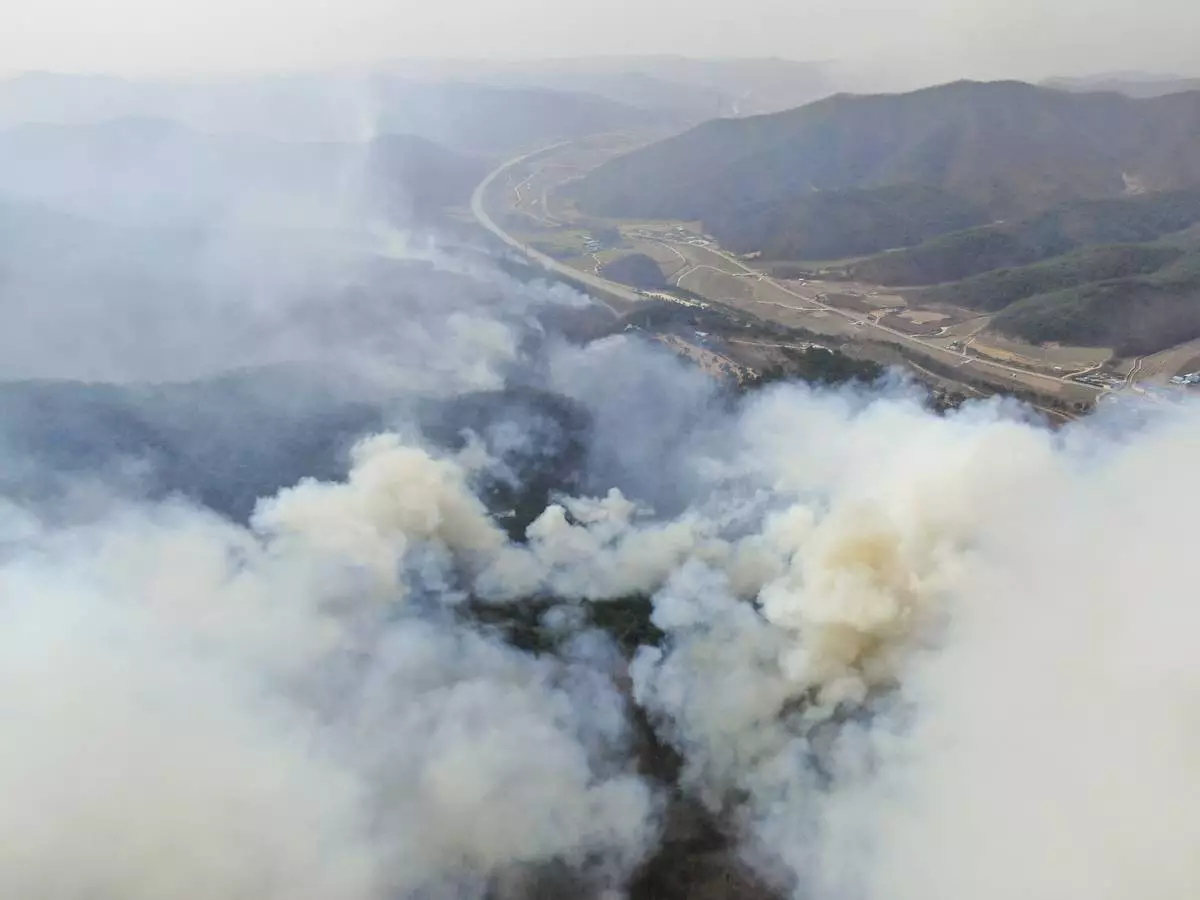
Smoke rises from a mountain in Andong, South Korea, Tuesday, March 25, 2025. (Kim Doo-hoon/Yonhap via AP)
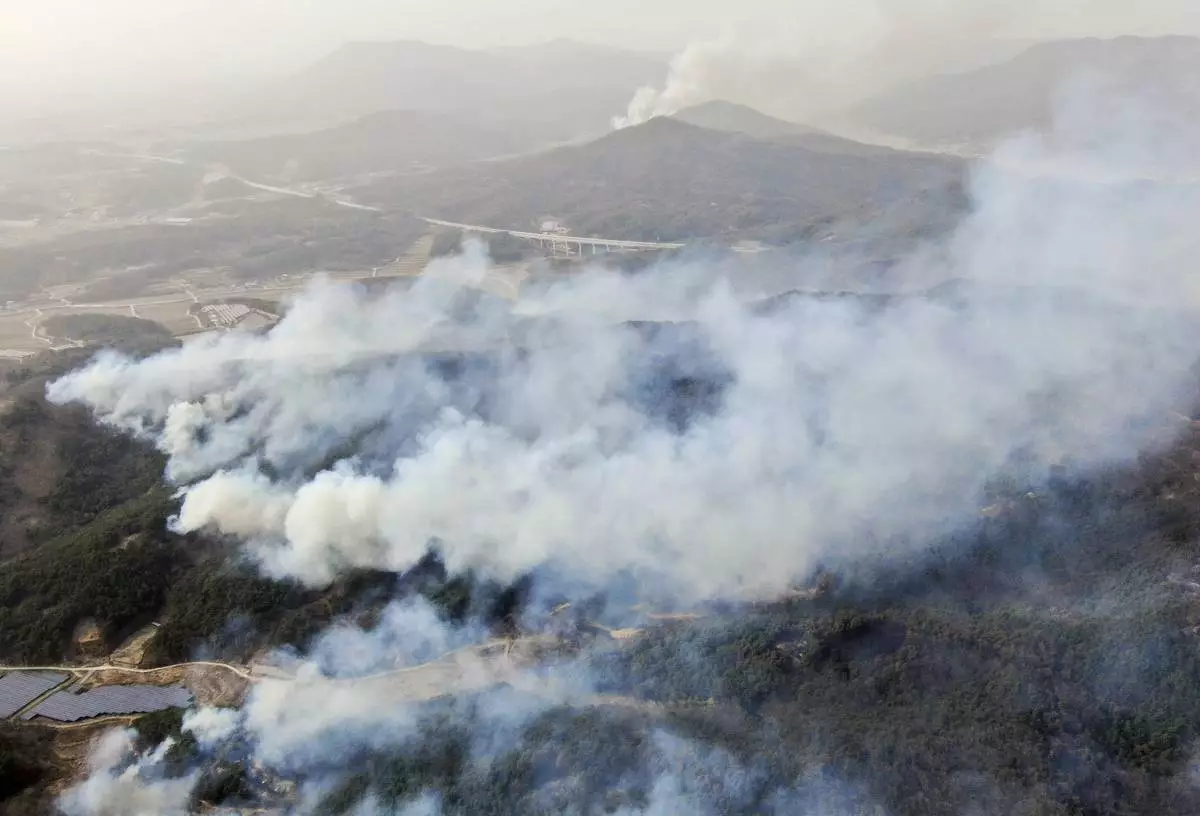
Smoke rises from a mountain in Andong, South Korea, Tuesday, March 25, 2025. (Kim Doo-hoon/Yonhap via AP)
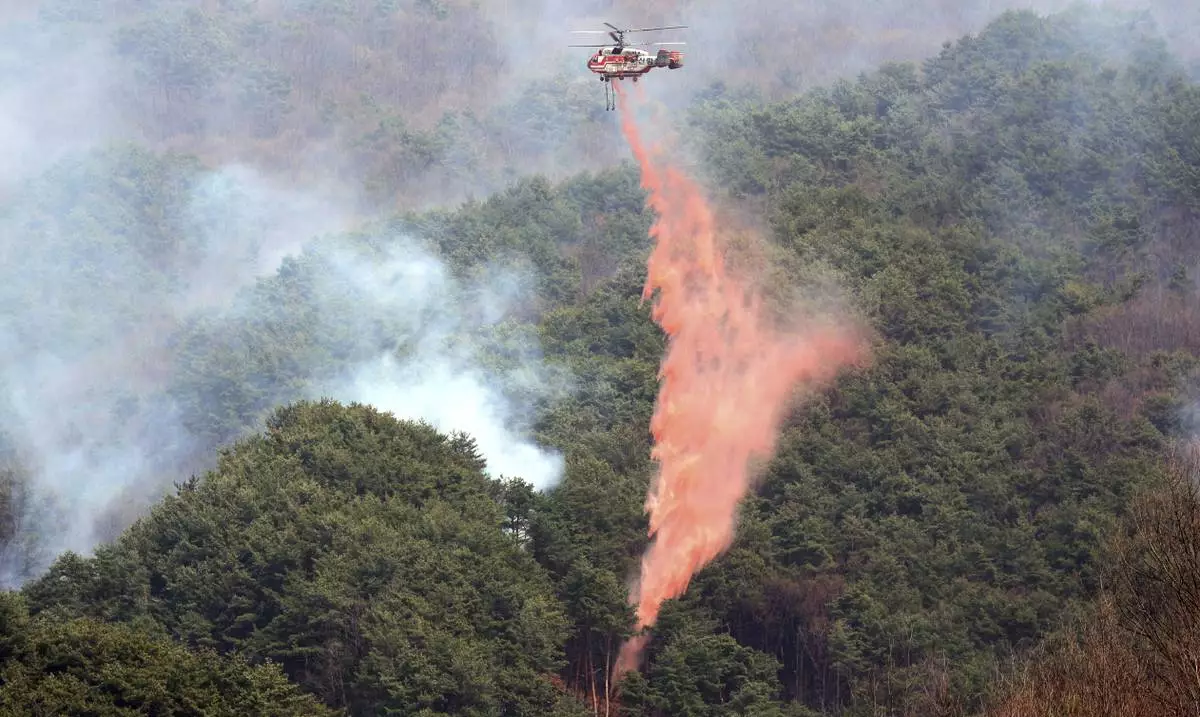
A Korea Forest Service helicopter dumps fire retardant on a wildfire in Sancheong, South Korea, Tuesday, March 25, 2025. (Kim Dong-min/Yonhap via AP)
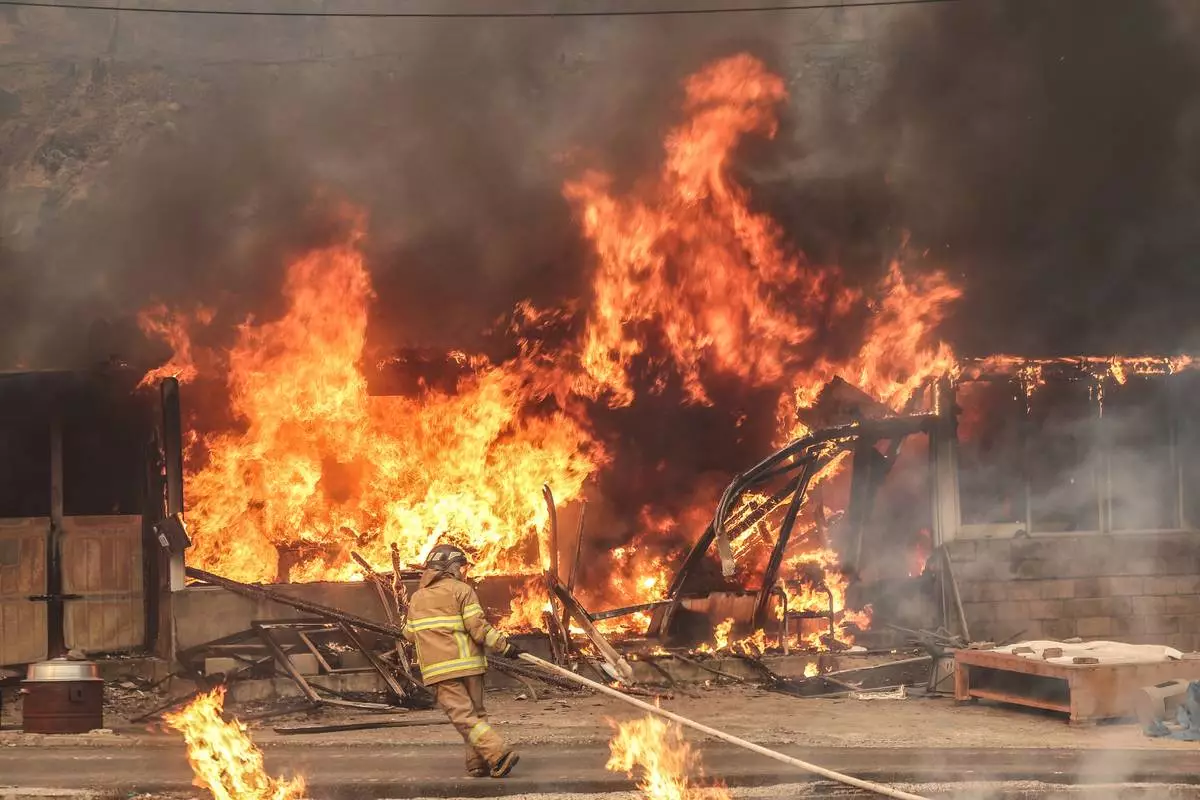
A firefighter works to extinguish a fire at a house that has been engulfed in a wildfire in Uiseong, South Korea, Tuesday, March 25, 2025. (Yoon Gwan-shick/Yonhap via AP)
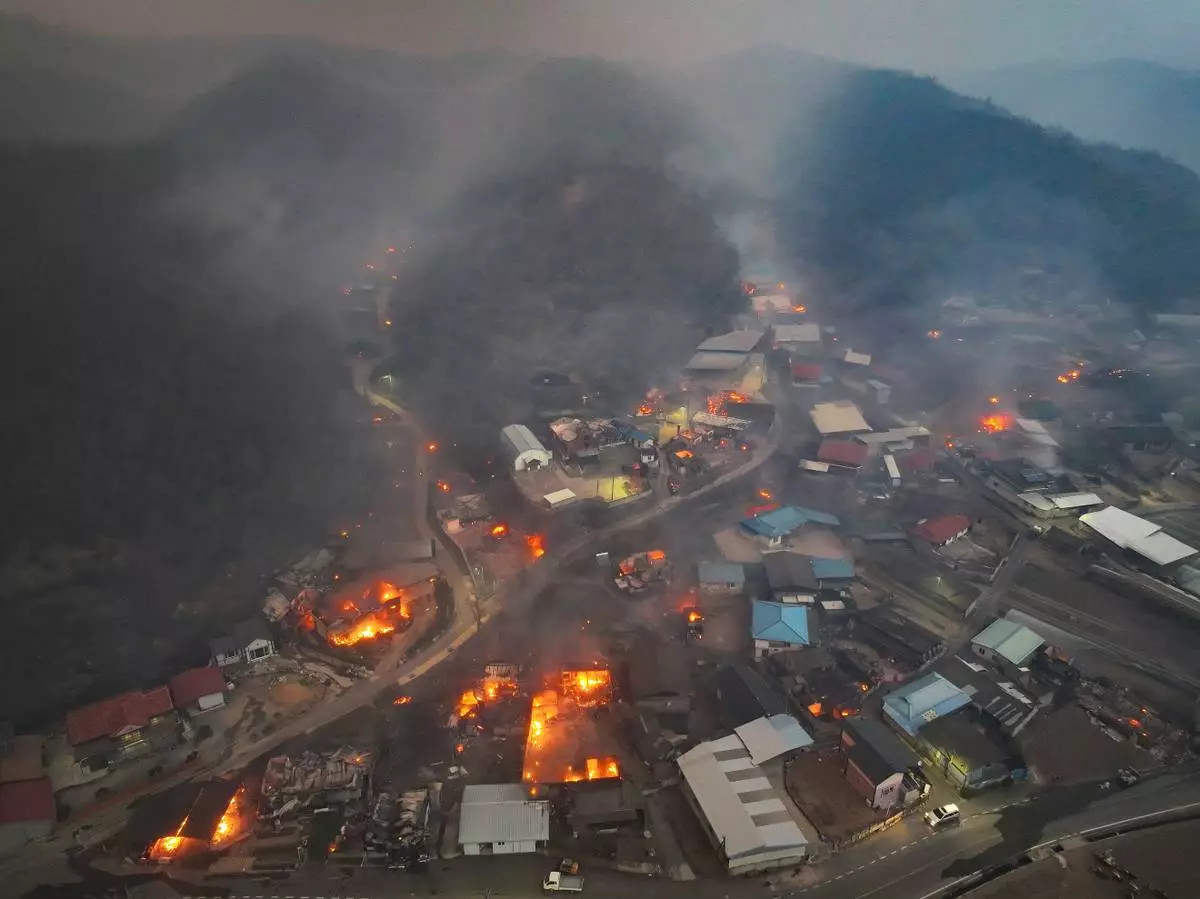
Houses burn in a village after being engulfed by a wildfire fueled by strong winds in Uiseong, South Korea, Tuesday, March 25, 2025. (Yoon Gwan-shick/Yonhap via AP)
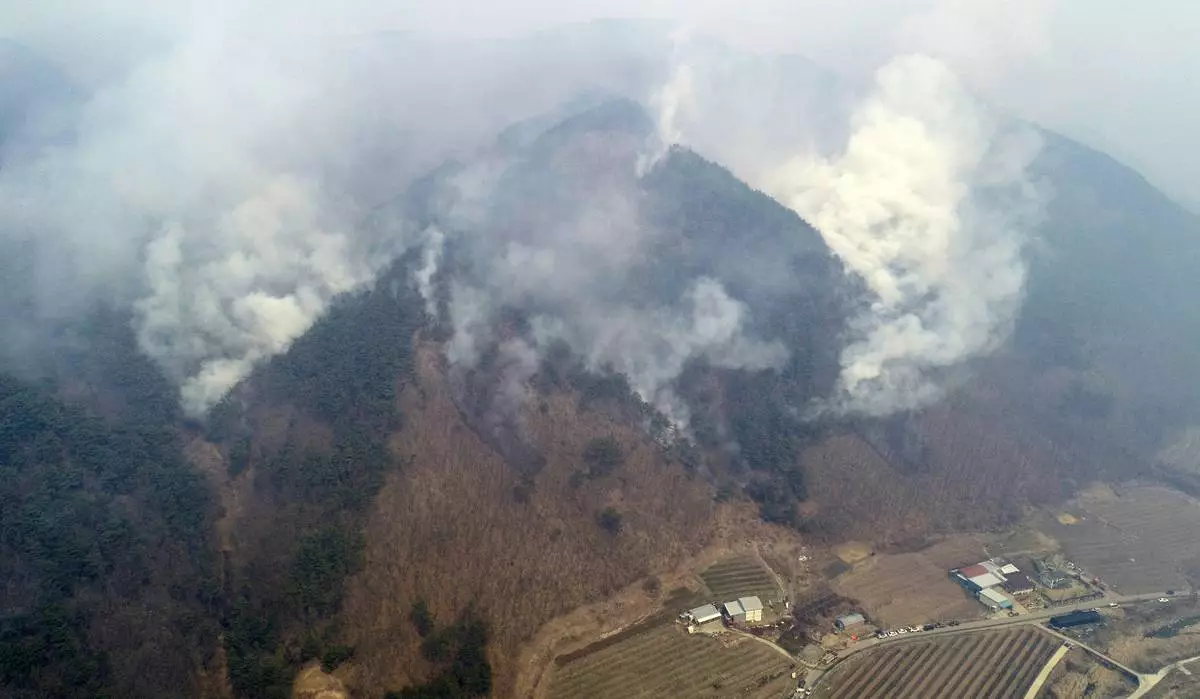
Smoke rises from a mountain in Andong, South Korea, Tuesday, March 25, 2025. (Kim Doo-hoon/Yonhap via AP)
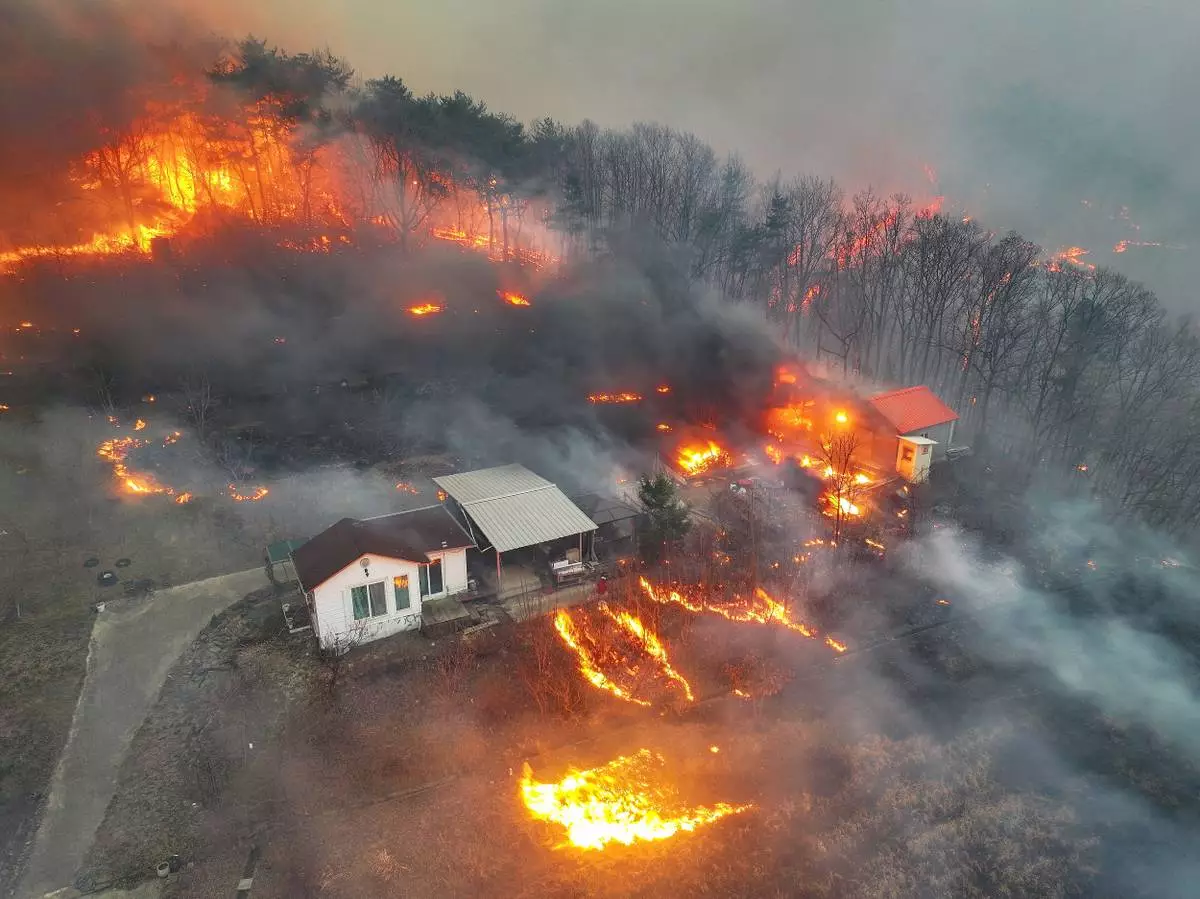
Houses burn in a village after being engulfed by a wildfire fueled by strong winds in Uiseong, South Korea, Monday, March 24, 2025. (Yoon Gwan-shick/Yonhap via AP)
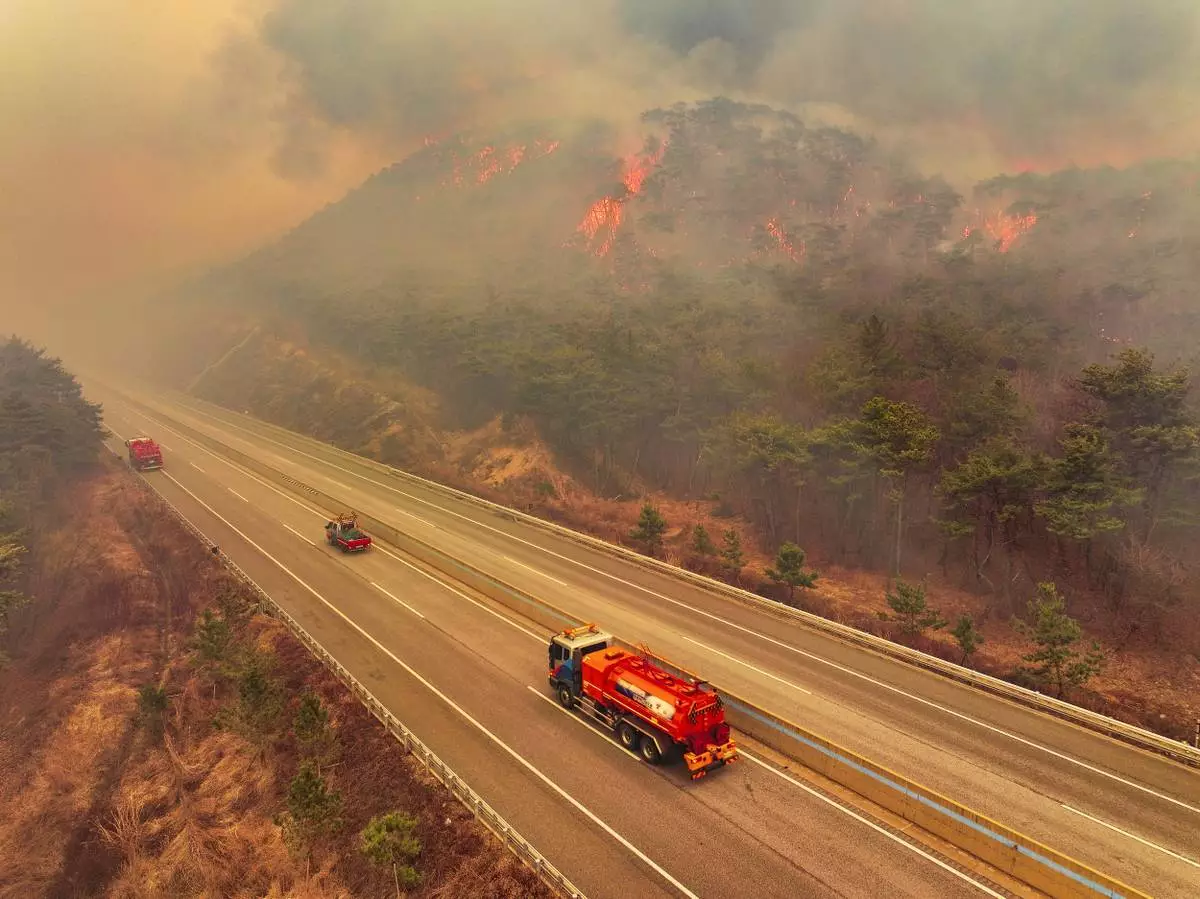
A road is closed as a wildfire fueled by strong winds spreads in Uiseong, South Korea, Monday, March 24, 2025. (Yoon Gwan-shick/Yonhap via AP)
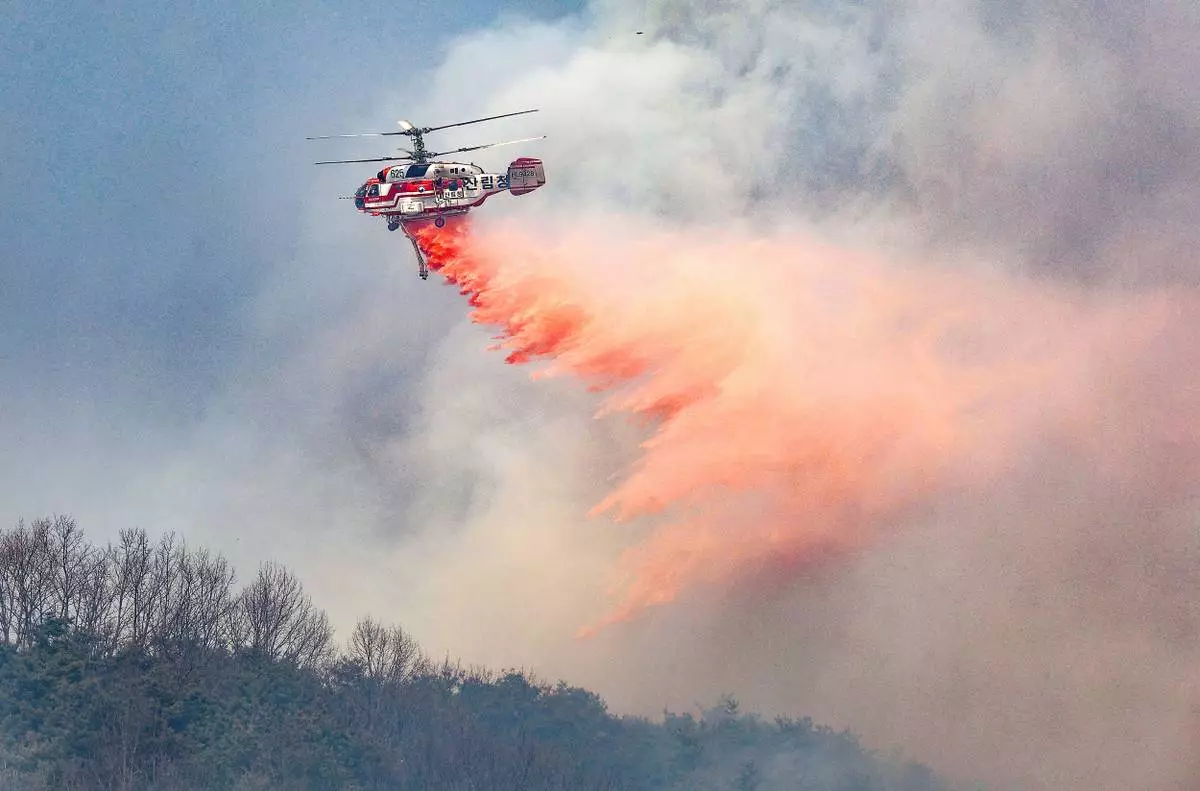
A Korea Forest Service helicopter dumps fire retardant on a wildfire in Uiseong, South Korea, Monday, March 24, 2025. (Yoon Gwan-shick/Yonhap via AP)
MINNEAPOLIS (AP) — As anger and outrage spilled out onto Minneapolis’ streets Thursday over the fatal shooting of a woman the day before by an Immigration and Customs Enforcement officer, a new shooting by federal officers in Oregon left two people wounded and elicited more scrutiny of enforcement operations across the U.S.
Hundreds of people protesting the shooting of Renee Good marched in freezing rain at night down one of Minneapolis’ major thoroughfares, chanting “ICE out now” and holding signs saying, “killer ice off our streets." Protesters earlier vented their outrage outside a federal facility that is serving as a hub for the administration’s latest immigration crackdown on a major city.
The shooting in Portland, Oregon, took place outside a hospital in the afternoon. A man and woman were shot inside a vehicle, and their conditions were not immediately known. The FBI and the Oregon Department of Justice were investigating. Mayor Keith Wilson and the city council called on ICE to end all operations in the city until a full investigation is completed.
Just as it did following the Minneapolis shooting, the Department of Homeland Security defended the actions of the officers in Portland, saying the incident occurred after a Venezuelan man with alleged gang ties and who was involved in a recent shooting tried to “weaponize” his vehicle to hit the officers. It was not yet clear if witness video corroborates that account.
Homeland Security Secretary Kristi Noem, President Donald Trump and others in his administration have repeatedly characterized the Minneapolis shooting as an act of self-defense and cast Good as a villain, suggesting she used her vehicle as a weapon to attack the officer who shot her.
Vice President JD Vance said the shooting was justified and Good, a 37-year-old mother of three, was a “victim of left-wing ideology.”
“I can believe that her death is a tragedy while also recognizing that it is a tragedy of her own making,” Vance said, noting that the officer who killed her was injured while making an arrest last June.
But state and local officials and protesters rejected that characterization, with Minneapolis Mayor Jacob Frey saying video recordings show the self-defense argument is “garbage.”
The shooting happened on the second day of the Trump administration's immigration crackdown on the Twin Cities of Minneapolis and St. Paul, which Homeland Security said is the biggest immigration enforcement operation ever. More than 2,000 officers are taking part, and Noem said they have made more than 1,500 arrests.
It provoked an immediate response in the city where police killed George Floyd in 2020, with hundreds of people turning up to the scene to vent their outrage at the ICE officers and the school district canceling classes for the rest of the week as a precaution.
Good’s death — at least the fifth tied to immigration sweeps since Trump took office — has resonated far beyond Minneapolis, as protests took place or were expected this week in many large U.S. cities.
“We should be horrified,” protester Shanta Hejmadi said. “We should be saddened that our government is waging war on our citizens.”
Protesters blocked the street where Good was shot with makeshift barricades constructed out of garbage cans, Christmas trees and canopies. People gave out coffee and water, while fires burned in metal drums to keep visitors warm.
The Minnesota agency that investigates officer-involved shootings said Thursday that it was informed that the FBI and U.S. Justice Department would not work with the it, effectively ending any role for the state to determine if crimes were committed. Noem said the state has no jurisdiction.
“Without complete access to the evidence, witnesses and information collected, we cannot meet the investigative standards that Minnesota law and the public demands,” said Drew Evans, head of the Minnesota Bureau of Criminal Apprehension.
Gov. Tim Walz demanded that the state be allowed to take part, repeatedly emphasizing that it would be “very difficult for Minnesotans” to accept that an investigation excluding the state could be fair.
Noem, he said, was “judge, jury and basically executioner” during her public comments.
Frey, the mayor, told The Associated Press: “We want to make sure that there is a check on this administration to ensure that this investigation is done for justice, not for the sake of a cover-up."
Several bystanders captured video of Good's killing, which happened in a neighborhood south of downtown.
The recordings show an officer approaching an SUV stopped across the middle of the road, demanding the driver open the door and grabbing the handle. The Honda Pilot begins to pull forward, and a different ICE officer standing in front of it pulls his weapon and immediately fires at least two shots at close range, jumping back as the vehicle moves toward him.
It is not clear from the videos if the vehicle makes contact with the officer, and there is no indication of whether the woman had interactions with agents earlier. After the shooting the SUV speeds into two cars parked on a curb before crashing to a stop.
The federal agent who fatally shot Good is an Iraq War veteran who has served for almost two decades in the Border Patrol and U.S. Immigration and Customs Enforcement, according to records obtained by The Associated Press.
Noem has not publicly named him, but a Homeland Security spokesperson said her description of his injuries last summer refers to an incident in Bloomington, Minnesota, in which court documents identify him as Jonathan Ross.
Ross got his arm stuck in the window of a vehicle of a driver who was fleeing arrest on an immigration violation. He was dragged roughly 100 yards (90 meters) before he was knocked free, records show.
He fired his Taser, but the prongs did not incapacitate the driver, according to prosecutors. Ross was transported to a hospital.
A jury found the driver guilty of assaulting a federal officer with a dangerous weapon.
Attempts to reach Ross, 43, at phone numbers and email addresses associated with him were not successful.
DHS assistant secretary Tricia McLaughlin also did not confirm his identity but said the officer involved in the shooting was selected for ICE's special response team, which includes a 30-hour tryout and additional training.
Associated Press reporters Steve Karnowski and Mark Vancleave in Minneapolis; Ed White in Detroit; Valerie Gonzalez in Brownsville, Texas; Graham Lee Brewer in Norman, Oklahoma; Michael Biesecker in Washington; Jim Mustian in New York; Ryan Foley in Iowa City, Iowa; and Hallie Golden in Seattle contributed.
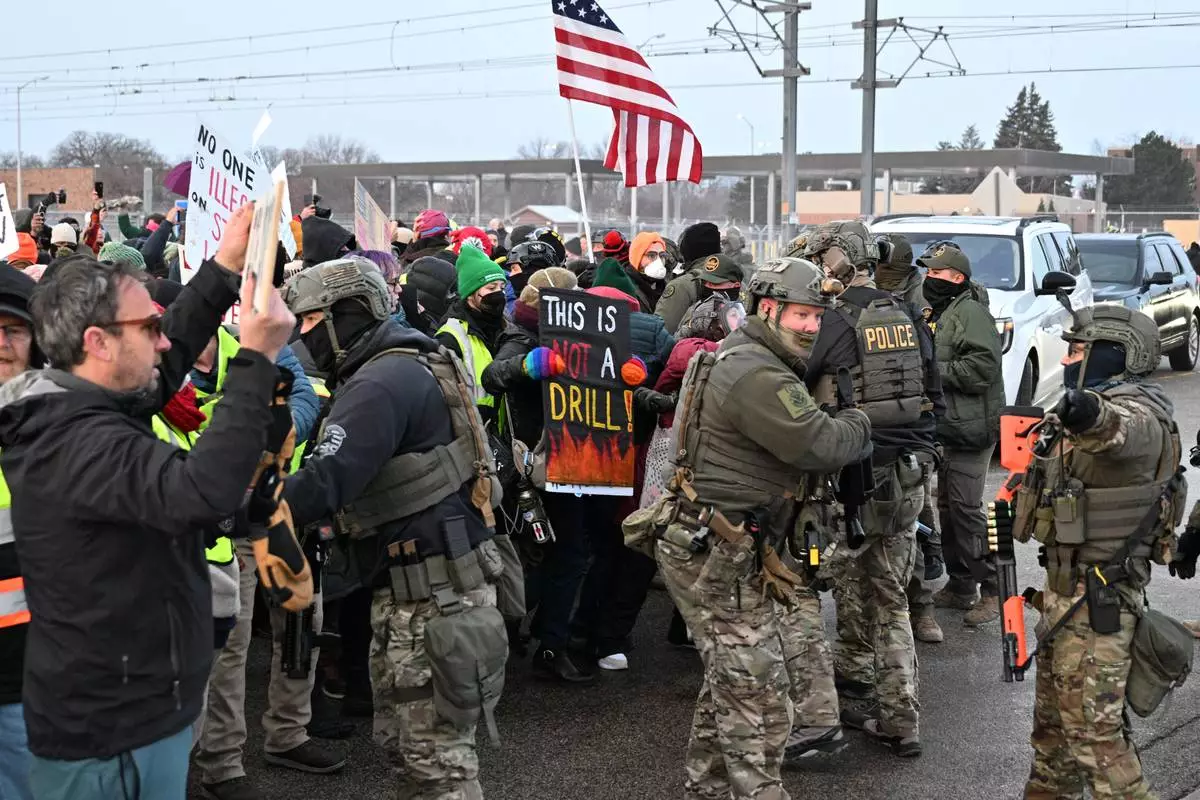
Protesters confront federal agents outside the Bishop Henry Whipple Federal Building, Thursday, Jan. 8, 2026, in Minneapolis, Minn. (AP Photo/Tom Baker)
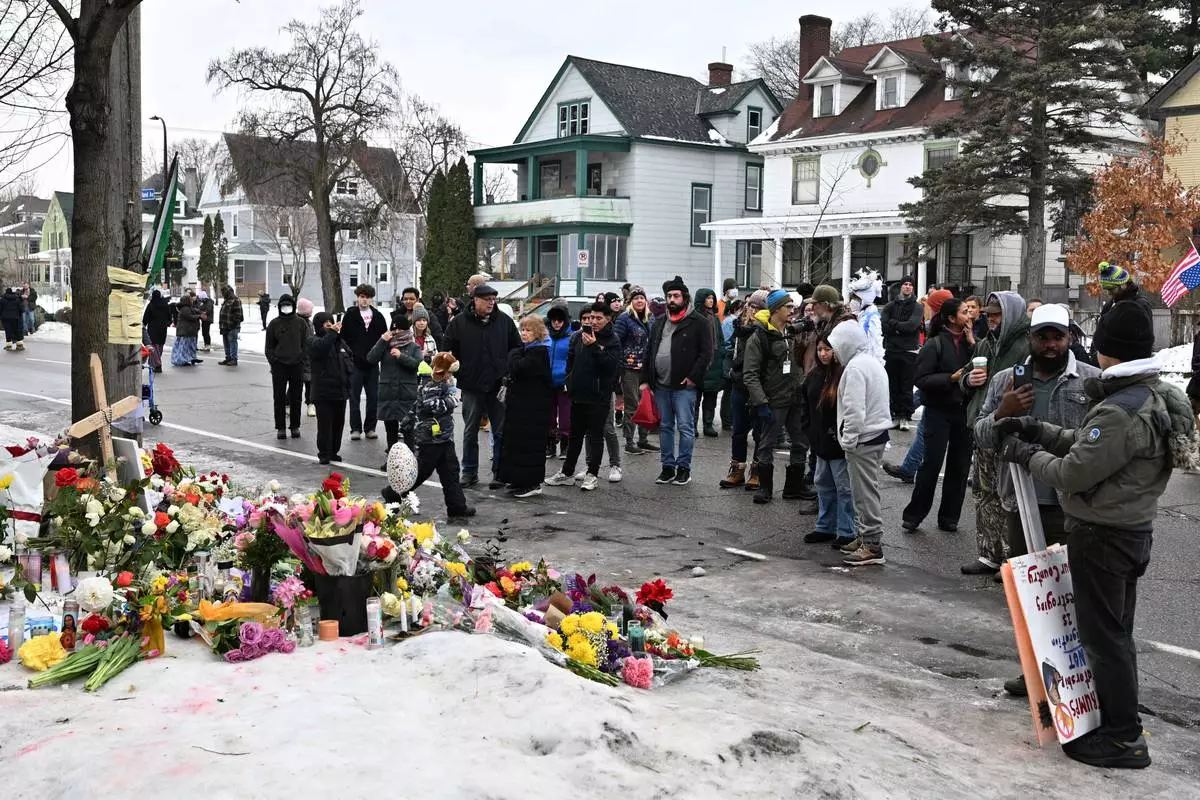
People gather around a makeshift memorial honoring the victim of a fatal shooting involving federal law enforcement agents, near the site of the shooting, Thursday, Jan. 8, 2026, in Minneapolis. (AP Photo/Tom Baker)
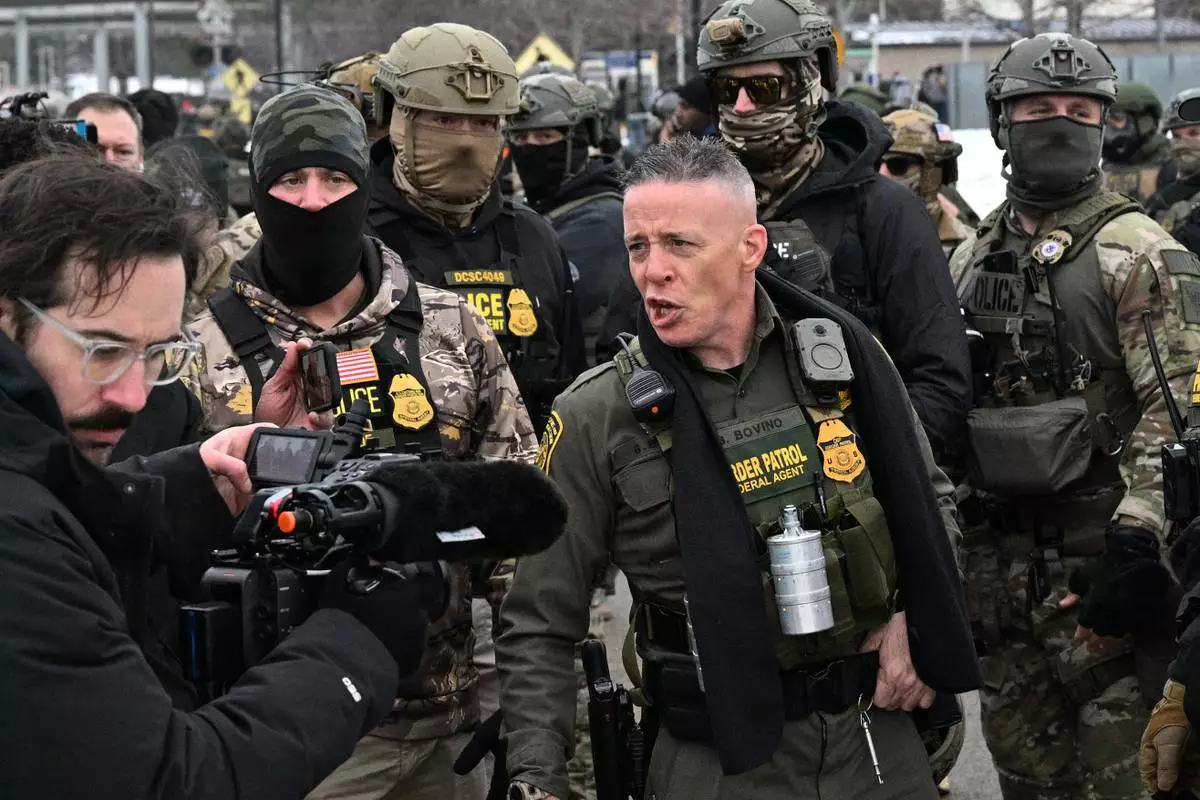
U.S. Border Patrol Cmdr. Gregory Bovino arrives as protesters gather outside the Bishop Henry Whipple Federal Building, Thursday, Jan. 8, 2026, in Minneapolis, Minn. (AP Photo/Tom Baker)

A protester pours water in their eye after confronting law enforcement outside the Bishop Henry Whipple Federal Building, Thursday, Jan. 8, 2026, in Minneapolis, Minn. (AP Photo/Tom Baker)
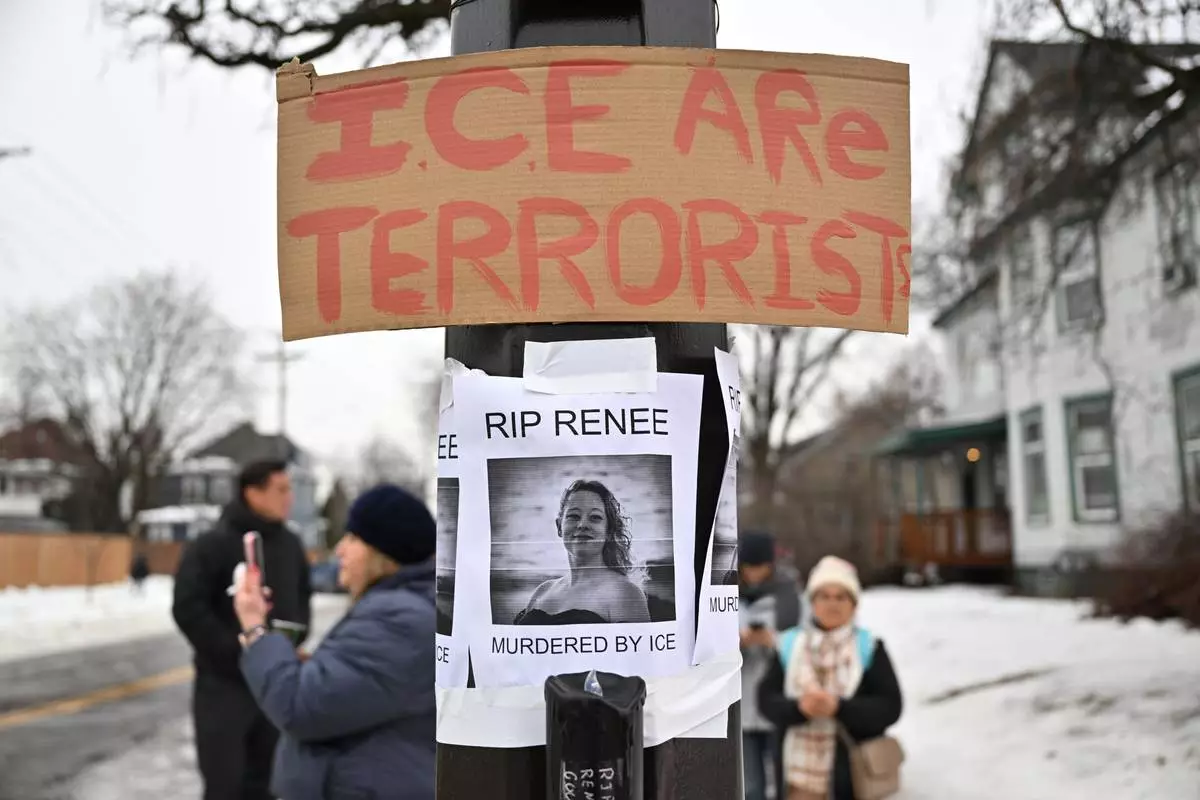
People gather around a makeshift memorial honoring the victim of a fatal shooting involving federal law enforcement agents, near the site of the shooting, Thursday, Jan. 8, 2026, in Minneapolis. (AP Photo/Tom Baker)











